6+ SAMPLE Bible School Business Plan
-
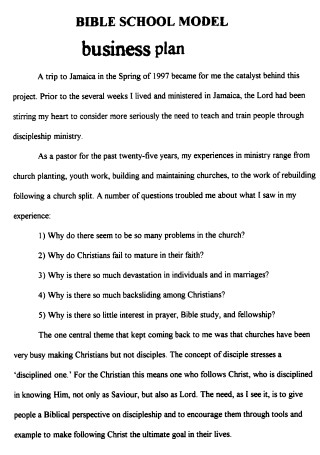
Bible School Model Business Plan
download now -
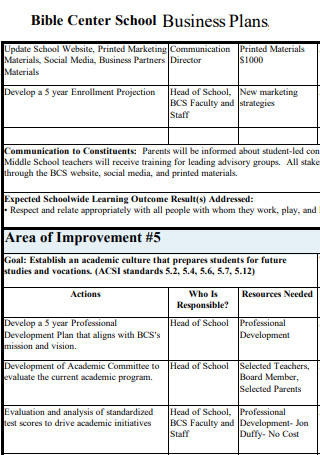
Bible Center School Business Plan
download now -
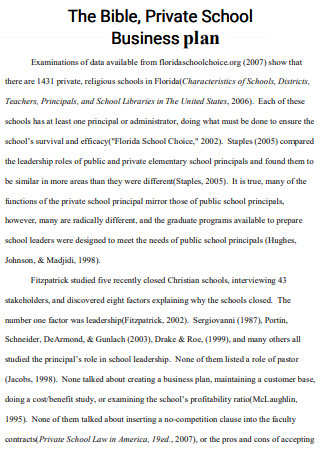
Bible Private School Business Plan
download now -
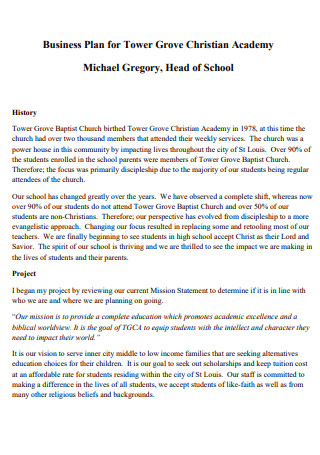
Christian Academy Business Plan
download now -
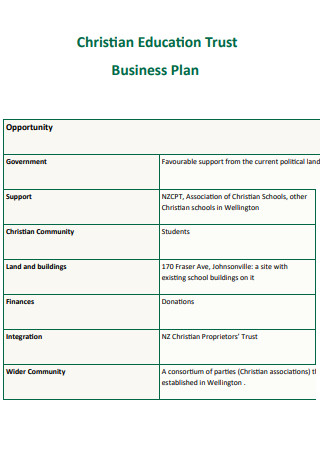
Christian Education Trust Business Plan
download now -

Christian School Strategic Business Plan
download now -
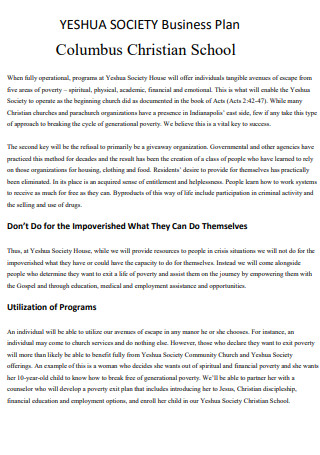
Yeshua Society School And Church Business Plan
download now
FREE Bible School Business Plan s to Download
6+ SAMPLE Bible School Business Plan
What Is a Bible School and a Bible School Business Plan?
What is the Importance of a Bible School?
Steps on How to Create a Bible School Business Plan
FAQs
What other names is a Bible School known for?
What is a Seminary?
How Important is a Business Plan in a Bible School?
What Is a Bible School and a Bible School Business Plan?
Let’s break down the terms in order to get the bigger picture. Firstly, a Bible School is often used interchangeably with the term Bible College. A Bible School is defined as a school or an organization or a program dedicated or designed to primarily teach Christian biblical principles, or studies, based primarily on the Bible. The school can be in the form of a church group, Sunday program school, an actual Bible educational institution such as a college, seminary, et cetera. A Bible School business plan is the process of effective planning of the growth, development, and sustainability of the Bible School. It involves mainly the business operation side of the Bible School, how it can sustain itself financially and grow either in a short-term or in a long-term basis. Aside from the typical Sunday Bible School, there are many Bible School educational institutions that offer diplomas, associate, and undergraduate bachelor’s degrees in Biblical studies. There are some schools that even offer graduate degree programs. Although the religion behind it is a force to be reckoned with, a Bible School’s number one challenge is how it can thrive in today’s world where there are so many degrees offered out there to contend with, and in which people nowadays are seeking careers more for the purpose of financially stability rather than of faith-based career. These are but a few of the challenges addressed by a business plan tool.
What is the Importance of a Bible School?
Leaning on the advantage that Christianity is the largest religion in the world, with over 2 billion followers and supporters, it’s not surprising that the number of Bible Schools increased as well over the years. Some people would enter into the biblical education for the purpose of academic research, and some would enroll purely for the purpose of furthering the faith itself, either to become a priest, pastor, minister, or any kind of Christian authority figure. More so, we have come to understand that there is more to a Bible School than just your typical educational institution. Aside from the education it brings, here are the reasons why a Bible School is considered an important institution.
Steps on How to Create a Bible School Business Plan
Now that we have learned the important role a Bible School plays and its benefits, it’s time to create a plan to make the school effective and successful, and that is through the development of a business plan. Like all kinds of industry, a Bible School is an educational institution, industry, or trade, and its survival relies upon how its whole operation is being managed. A Bible School business plan sets out to analyze and identify opportunities for the school to be successful and to thrive financially as well. Aside from relying on its large number of Christian followers, a Bible School should effectively convey and prove that it can survive on its own through a given period of time, and therefore, proper planning becomes essential at this point. Below are the common steps taken when creating an effective Bible School business plan.
Step 1: Write down your Mission and Vision Statements
When creating your mission and vision statements, always consider who are the readers of your Bible School business plan. The business plan essentially serves as a roadmap, and oftentimes as well will serve as a proposal to future investors in the Bible School. The mission statement describes the existence and overall purpose of establishing the Bible School. The vision statement should identify what the Bible School hopes to accomplish in a given period of time. Since the Bible School is a faith-based educational institution, the mission and vision statement should contain mostly the development of characteristics through faith learning, anchored on Christian biblical context studies. Another concept that could be included in the statements is the training and development of future leaders and authorities in the Christianity doctrine or the Christian church. Make sure that the statements are brief and concise, avoiding ambiguity as much as possible.
Step 2: Doing a SWOT Analysis
Like in any trade, conducting a SWOT analysis is essential in ensuring that the organization flourishes. SWOT analysis means knowing the Bible School’s Strengths, Weaknesses, Opportunities, and Threats. A Bible School’s strengths could be the faith formation and character development through Christian learnings. Weaknesses could be in the form of lack of funding for the school, materials and equipment, manpower, or even a low number of enrollees. Opportunities could be taking advantage of the marketing trend to increase enrollment or potential school investors. Marketing trends through digital marketing such as social media marketing, blogs and vlogs posts, et cetera, could easily help spread the word of the Bible School’s existence. Threats are risks or anything that could negatively affect the Bible School’s operations. A sample threat could be an existing Bible School considered as a competitor in the same locale where you plan to establish your Bible School. Since a Bible School is a faith-based institution, another threat could be coming from different types of religious fanatics or extremists. Doing a SWOT analysis could later help you in forming strategies in countering the weaknesses and threats, and further developing and improving on the school’s strengths and opportunities.
Step 3: Determining the Resources
The resources for a Bible School could take a lot of shape and form. One of the resources could be in the form of financial resources or funds. Determine if you have enough funds to set up and run a Bible School. This will also help you later on identify if there is a need to look for more funds or investors. Another form of resource is manpower. A Bible School manpower refers to the teaching staff in the form of a deacon or a clergy, the school’s office employees, the maintenance plan personnel, and any kind of manpower position that is required in the operation of school. The manpower resource needs to be ascertained as well if it’s sufficient enough or there is a need for more employees or personnel. Another resource is the materials, tools, or equipment needed in teaching and operating the school. So for a Bible School, there is obviously a need for religious teaching and reading materials, and other tools and equipment usually found in a school’s operation, such as projectors, white boards, et cetera.
Step 4: Creating Strategic Action Plans
This is the part where you address the weaknesses, opportunities, or even the threats identified in your SWOT analysis. Number one challenge any schools would have is the number of enrolled students. The larger the number of enrollees, the higher the school’s potential income, and the longer the school will continue to operate. So perhaps one of your strategic plans should address how to increase the number of enrollees. An action plan could be through marketing strategies. Spread the word of the Bible School’s existence and course offerings via social media and other marketing tools such as newsletters, newspapers, billboards, flyers, et cetera. Having an active online presence and online platform is another action plan, making sure that the Bible School receives good reviews, feedback, and recommendations. Having good reviews and recommendations can also attract potential school investors. An action plan to address threats, especially threats that endangers school’s staff, students, and property, would be to heighten security by employing more security guards and the use of advanced security surveillance technology.
Step 5: Monitoring Results
Good planning always monitors the progress of every action step taken from the start. This will measure the success, efficacy and sustainability of the whole operation of the Bible School. Make sure to always take time to keep track of the school’s progress in terms of the number of enrollees, if it has increased or not, the satisfaction of both students and staff, and again, the reviews and feedback coming from third-parties. If there is a need for improvement in any areas, you could always go back and tweak some action plans as needed.
FAQs
What other names is a Bible School known for?
The word Bible School is often used interchangeably with Bible College. Sometimes it’s called seminary or divinity school. Bible College is often used when referring to a Bible School that offers higher degree courses in specific fields of Christianity, and are most of the times offered as a four-year degree program such as a bachelor’s degree.
What is a Seminary?
A Seminary is a type of Bible College that prepares students primarily for a career in the Christian church, either as part of the clergy or in the academics field.
How Important is a Business Plan in a Bible School?
A Bible School is considered as an industry or an organization, and like any other organization, it needs to thrive and be successful as a measurement of its effectiveness. A good business plan maps out the goals or objectives of a Bible School, and plans out strategies that could help improve or develop the whole operation of the school.
There are many different types of faiths and religions all over the world, but none as big as the religion of Christianity when it comes to the number of its population of followers and supporters. Establishing a Bible School is meant to herd and guide those followers and supporters into the true principles of the Christian faith. Like any other schools, a Bible School has its own systematic structure of learning, primarily anchored upon biblical learnings, and even has accredited degree courses offered to those who wanted to pursue further a career in the Christian ministry. And since it’s a school organization, its effectiveness is measured by how long its operation will run, the number of its student enrollees, and by the successes of their students’ outputs. All of these are laid out and planned out in a Bible School business plan.
Need some help in creating that effective Bible School business plan? Check out our business plan templates right now, and see how we make it easy for you to successfully run a Bible School!
